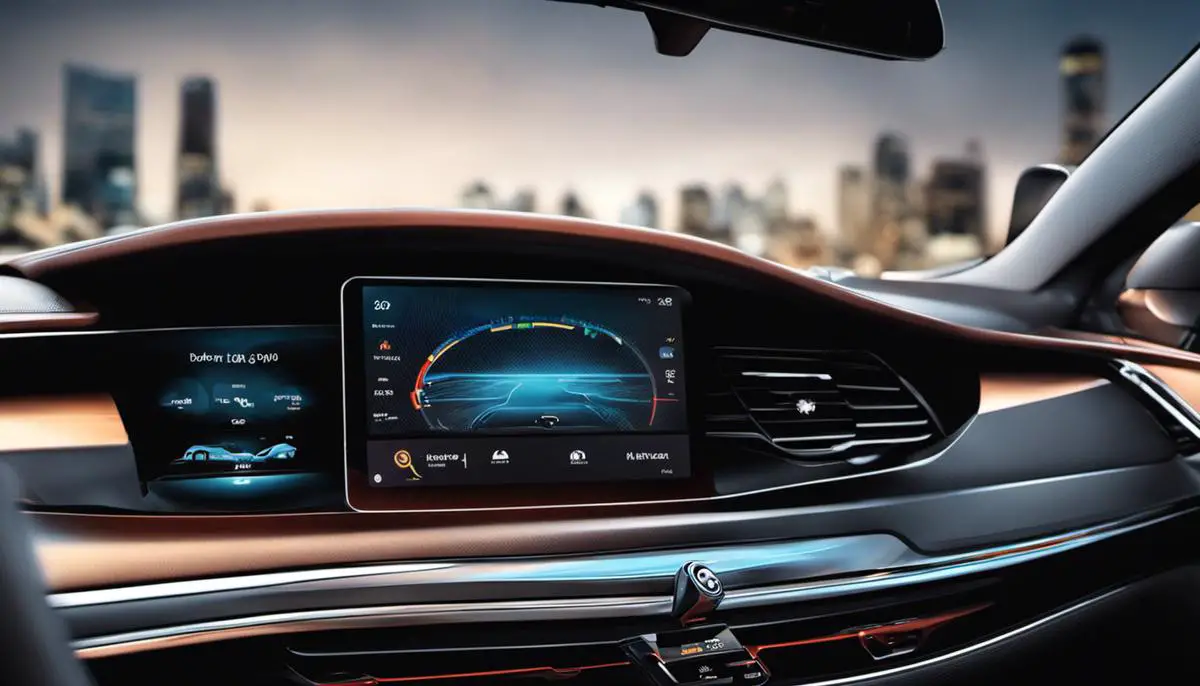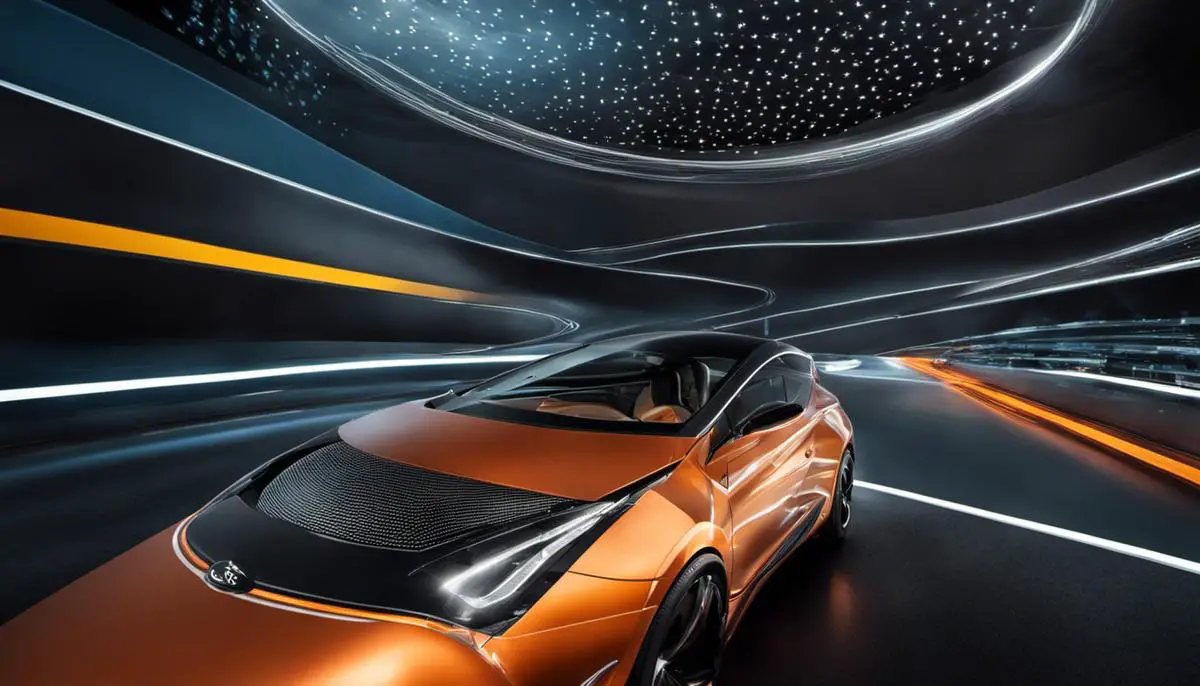Harnessing AI in Car Infotainment Systems: A Comprehensive Look
The breathtaking pace of technological advancements in recent years has brought artificial intelligence (AI) from the realms of science fiction into our daily lives. One of its compelling applications is in car infotainment systems, where it has fundamentally transformed the driving experience. Offering benefits ranging from improved navigation and entertainment to enhanced safety measures, AI is fast becoming an indispensable part of modern vehicles. This article will take you on a deep dive into how AI works in car infotainment systems, the benefits and wide-ranging applications it offers, the latest developments and cutting-edge innovations in this field, the predictions and implications for its future, and the challenges and concerns that come alongside its increasing adoption.
Understanding AI in Car Infotainment Systems
Understanding AI in Car Infotainment Systems
Artificial Intelligence (AI) has infiltrated nearly every aspect of our lives, including our vehicles. In car infotainment systems, AI serves as the brains behind the advanced functionalities that vastly improve the user experience. Infotainment systems, a fusion of “information” and “entertainment,” control a variety of features within the car, such as navigation, media playback, climate control, and smartphone integration, among others. AI is instrumental in streamlining these operations and enabling advanced features.
The Role of AI in Infotainment Systems
AI works in car infotainment systems by learning the behaviors and preferences of the driver. Over time, it can adapt to the driver’s routines. For example, if one always calls home at a particular time, the AI could suggest making this call. It uses machine learning and predictive analytics to anticipate the driver’s needs, thereby improving the overall driving experience.
AI is also responsible for voice recognition in infotainment systems, which enables hands-free operation of various features. Using natural language processing, AI can understand and act on voice commands, allowing users to change radio channels, make phone calls, or get directions without lifting a finger off the steering wheel.
Enhancing Safety with AI
An important aspect of AI in infotainment systems is enhancing the safety of both the driver and passengers. Distracted driving is a major concern, and AI helps mitigate this risk by reducing the need for drivers to physically operate the infotainment system. Voice commands and gesture controls, powered by AI, mean drivers can keep their eyes on the road and hands on the wheel.
Moreover, AI can also monitor the driver’s behavior for signs of fatigue or inattention. Many systems are capable of recognizing when a driver is drowsy or distracted and can alert them or even take corrective action, such as slowing down the vehicle or guiding it back into its lane.
Integrating AI and Vehicle Telematics
AI in car infotainment systems may also integrate with a vehicle’s telematics systems – this means they combine with GPS technologies, onboard diagnostics, and more to provide a comprehensive overview of vehicle performance and health. This use of AI enhances predictive maintenance by identifying potential problems before a breakdown. It can alert drivers to issues such as low tire pressure, waning battery life, or needed oil changes.
Also, in event of an accident, AI can automatically send a distress signal to emergency services, further enhancing safety. With the detailed vehicle data at hand, AI can pinpoint the cause of an issue and suggest potential solutions, taking uncertainty out of the equation for drivers.
The Future of AI in Car Infotainment Systems
In the coming years, AI will become increasingly integral to car infotainment systems. It’s conceivable that these systems could interact with smart homes, turning on lights as the car pulls into the driveway or adjusting the thermostat prior to your arrival. Moreover, the AI in your vehicle could personalize the driving experience, recognizing different drivers and instantly adjusting seat positions, climate settings, and preferred entertainment.
The presence of AI in car infotainment systems marks a significant advancement in driving safety, comfort, and personalization. As AI technologies continue to evolve, infotainment systems will undoubtedly become more sophisticated and intuitive, offering an unprecedented driving experience.

The Benefits and Applications of AI in Car Infotainment Systems
AI’s Application in Car Infotainment Systems
Artificial Intelligence is revolutionizing various industries, and the automotive field is no exception. Among the various facets of automotive AI, a major focus is on in-car infotainment systems. These systems, which have traditionally offered features such as entertainment, navigation, and device connectivity, are now integrating AI at a rapid pace to leverage its numerous benefits.
The Advantages of AI in Infotainment Systems
The use of AI in infotainment systems enhances a driver’s experience, streamlining operations and making tasks such as dialing phone numbers, changing radio stations, or conducting an online search, hands-free. In an intelligent car, AI can learn from the driver’s habits and preferences, allowing for a more personalized and adapted software interface.
AI can also analyze a driver’s behavior and mood, adjusting the in-car environment to their preferences. It can control vehicle settings, like ambient temperature and seat position, to ensure the driver’s maximum comfort. AI can monitor driver attentiveness, increasing safety by warning the driver when they exhibit signs of drowsiness or distraction.
Applications of AI in Infotainment Systems
AI’s application in infotainment systems is wide-ranging. Beyond personalizing the in-car experience, AI also makes the knowledge discovery process easier. It enables a platform for contextual conversation, improving the interaction between the driver and the system. In addition, AI can enhance navigation by learning frequently visited locations, suggesting alternative routes, and providing real-time traffic updates.
Entertainment is another key space where AI shines. AI-powered voice agents can play music from a specific artist, album, or genre according to your specific command. It can also manage other forms of entertainment like video and games for passengers.
Rise of AI Integration in Infotainment Systems
Today, many automobile manufacturers are incorporating AI in their infotainment systems due to the benefits it brings to the table. Major car companies like Tesla, Mercedes-Benz, Audi, and Volvo are pioneering efforts in this space. Their AI-powered infotainment systems offer smart features like voice recognition, mood-based playlists, and driver alert systems, aimed at enhancing driver safety and comfort.
AI’s Role in Enhancing Car Safety
Infotainment systems powered by AI don’t just improve the driving experience; they boost vehicle safety too. By monitoring driver behavior to detect signs of fatigue or distraction, AI can strategically deploy countermeasures to ensure the driver’s alertness. In some cars, AI is equipped to automatically slow the vehicle down or send an alert to a human supervisor in the event that the driver fails to respond to warnings.
AI also aids in the vehicle’s preventive maintenance by predicting possible malfunctions based on the vehicle’s data and reminding drivers of necessary servicing. This proactive approach heads off many of the issues that could potentially compromise vehicle safety.
The intersection of artificial intelligence (AI) technology and car infotainment systems represents a significant forward step in the development of automotive technology. The increasing importance of this interconnectedness is continually transforming the driving landscape, offering more personalized driving experiences and improved safety features.

Recent Developments and Innovations in AI Infotainment Systems
The Technological Revolution: AI in Car Infotainment Systems
AI is now at the forefront of the ongoing evolution within car infotainment systems. This advanced technology has opened doors for an array of intuitive additions, which have led to notable enhancements in the design of automobile user interfaces.
By deploying AI into infotainment systems, a new degree of personalization can be achieved. The technology possesses the ability to analyze user preferences and driving behaviours, thereby enabling the construction of experiences that are tailored to the driver’s unique tastes and habits. From learning routine destinations to remembering favored songs and optimal temperature settings, AI can generate predictive suggestions designed exclusively around the driver’s lifestyle.
Breakthroughs in Voice Command Technologies
One of the biggest breakthroughs is the integration of AI-powered voice command systems into car infotainment systems. This technology allows drivers to interact with their vehicles in a more natural, human-like way. Instead of manually browsing through menus and pressing buttons, drivers can simply talk to their cars to play music, make phone calls, send texts, set navigation, control vehicle features and get important information about their vehicle. This not only makes the driving experience more enjoyable but also significantly safer as it minimizes distractions while driving.
AI and Enhanced Connectivity
AI is also enhancing connectivity capabilities of car infotainment systems. With internet connectivity, infotainment systems powered by AI can provide real-time traffic updates, weather updates, assist in navigation, offer news updates, and even support in-vehicle mobile applications. Moreover, AI is enabling car-to-car communication where one car can share its sensor and navigation data with another car to promote safety and efficiency on the road.
Innovative Features: AI and Autonomous Driving
AI is also a fundamental part of the advanced driver-assistance systems (ADAS) used in autonomous driving. In the autonomous driving space, AI helps interpret the sensory data from radars, LiDAR, and cameras, thus making sense of the external environment and planning safe navigational paths.
Entertainment and Comfort
AI has also ramped up the entertainment factor in car infotainment systems. Features like personalized music and multimedia management, in-car Wi-Fi, movie streaming, and video game compatibility are now becoming more common, thanks to advancements in AI. Furthermore, AI allows the vehicle to adjust the seating position, cabin temperature, and lighting based on the driver’s learned preferences, thus improving overall comfort.
Discover the Future with AI in Car Infotainment Systems
As AI continues to advance and evolve, the possibilities it offers to car infotainment systems are astounding. Imagine your car able to intuitively assess your emotional state and adjust its settings to create a comfortable atmosphere. For instance, if you’re exhibiting signs of stress, the AI could put on some relaxing music, recommend to have a rest, or even guide you through a less populated route. This is not something out of a science fiction movie; it’s the very real potential that the rapidly advancing field of AI presents for upcoming infotainment systems. The future of car technology is promising a highly intuitive, personalized, and innovative experience.

Future Implications and Predictions for AI in Car Infotainment Systems
Today’s AI in Car Infotainment Systems: What Can It Do?
These AI-driven infotainment systems are revolutionizing the automotive industry as we know it. By utilizing machine learning and sophisticated algorithms, these systems are not mere enhancements but actually signify a new era in car technology. They’re expertly designed to deliver automated and personalized experiences tailored to each driver. Think state-of-the-art navigation systems, a variety of in-car entertainment options, seamless smartphone connectivity, and even advanced interactions between the driver and the passengers. The journey into the future of automotive technology has only just begun.
How Does AI Improve Car Infotainment Systems?
AI adds numerous enhancements to current infotainment systems. For example, AI enables voice recognition systems, enabling drivers to interact with their cars to accomplish tasks without taking their hands off the wheel or eyes off the road. By learning from the driver’s habits and preferences, AI can predict what the driver wants and needs, whether it’s playing their favorite music, informing of traffic changes, or adjusting the cabin’s temperature.
The Key Role of Machine Learning in AI Car Infotainment
Machine learning, a subset of AI, is critical to taking in-car infotainment to new levels. It allows the system to learn from previous interactions and experiences, meaning the infotainment system can consistently improve and become more intuitive over time. For example, if a driver usually calls a particular contact after work, machine learning can recognize this pattern and suggest the action in advance.
Integration of AI with Augmented Reality
Another excelling factor in the future of AI in car infotainment systems will be the incorporation of augmented reality (AR). AR can enhance GPS navigation systems by overlaying directional information on top of a live camera feed, making it much easier and safer for drivers to follow routes. Together with AI technologies, AR can provide anticipatory alerts about possible hazards on the road.
AI and Driver Safety
While entertainment is a significant aspect of in-car infotainment, AI is also set to significantly enhance safety. Advanced AI models can monitor driver behavior, noting any signs of fatigue or distraction and alerting the driver or activating preventative measures. Furthermore, elements such as facial and gesture recognition could evolve to interpret whether a driver is paying attention to the road.
Future Trends: Personalized AI Infotainment Experience
In the future, we can expect to see AI-powered car infotainment systems becoming increasingly personalized. By learning from a driver’s actions and behaviors, these systems will be able to deliver a truly bespoke experience. For example, they may offer personalized news updates, recommend nearby attractions or restaurants based on preferences, or even adjust the vehicle’s settings to match the driver’s comfort.
The Transformation of the Automotive Industry
The future of automobiles is steering towards automation, and the role of sophisticated infotainment systems is expected to intensify. The integration of AI in these systems can postulate a new revenue model for auto makers. Through cultivating unique and personalized in-car experiences, they can enhance brand loyalty and patron satisfaction. The revolutionary tech in the infotainment system holds the potential to redefine the in-car experience, enriching the value proposition of cars and arguably influencing consumers’ buying decisions.

Photo by dmotionmedia on Unsplash
Challenges and Concerns about AI in Car Infotainment Systems
Decoding the Functionality of AI in Car Infotainment Systems
The amalgamation of Artificial Intelligence (AI) with car infotainment systems has revolutionized our interaction and engagement with our vehicles. Harnessing the power of machine learning and natural language processing capabilities, these systems deliver tailor-made experiences, support real-time updates and navigation, respond to voice-activated commands, and offer a variety of interactive features and automated controls designed to optimize consumer convenience.
Potential Downside: Privacy Issues
One of the primary concerns surrounding the use of AI in car infotainment systems is the issue of privacy. These systems often require the collection and processing of personal data, such as car location, trip history, user inputs, personally identifiable data, and possibly biometric data. This can raise serious privacy concerns if misused or mishandled, especially considering the ongoing incidents of data breaches across various industries. Hence, ensuring stringent data privacy measures and clear communication about the data use and access permissions with the car users becomes crucial.
Potential Downside: Security Issues
Beyond privacy issues, the integration of AI in car infotainment systems may open new avenues for cyber-attacks. Sophisticated hackers could potentially exploit these systems to compromise vehicle functioning, steal sensitive data, or manipulate system controls. This presents a significant security challenge, requiring robust encryption, authentication, and intrusion detection mechanisms to ensure a strong line of defense.
Technical Challenges in AI-driven Car Infotainment Systems
Implementing AI in car infotainment systems also comes with its own set of technical hurdles. Designing a user-friendly interface that is easy to navigate while on the move can be quite a challenge. Also, these systems must understand and respond accurately to voice commands despite the presence of significant ambient noise within a moving vehicle. The system’s response times must be quick and the AI must be capable of learning and adapting to the driving styles and preferences of different users.
Concerns Over Driver Distraction
While these AI-powered systems aim to enhance user convenience and provide a plethora of services, there are concerns about driver distraction. Engaging with the infotainment system, even via voice controls, can draw a driver’s attention away from the road. Research has suggested that such distractions could increase the likelihood of accidents, thus raising questions about the balance between infotainment features and safe driving practices.
Challenge of AI Ethics and Autonomy
Another looming concern of AI technology in general, which extends to car infotainment systems, has to do with AI ethics and autonomy. As AI increasingly makes decisions previously made by humans, it opens up philosophical discussions and practical concerns about the responsibility and accountability for those decisions, particularly when it comes to safety-related aspects. This requires rigorous testing, fine-tuning, and clear guidelines on the intended use and limitations of these AI systems.
Across all these potential downsides, challenges, and concerns, it is crucial to remember that AI technology in car infotainment systems is still relatively new and evolving. Thus, being aware of these issues is the first step towards finding solutions and creating a safer, more reliable, and privacy-conscious use of AI in our vehicles.

Technological evolutions are ceaseless, and as AI continues to unravel, we see its game-changing potential in many facets of life, including car infotainment systems. While promising an enhanced user experience with improved navigation, entertainment, connectivity, and safety, it also gets us pondering on possible challenges, risks, and uncertainties it could pose. With industry innovators racing to harness advancements in AI, the global automotive landscape is at the threshold of a new era. As consumers, embracing the potential of AI-powered infotainment systems, coupled with a heightened understanding of its limitations and challenges, ensures we are ready to safely navigate the road ahead.
Writio: Effortlessly create engaging content with Writio, an AI content writer that generates high-quality articles tailored to your style. This post was written by Writio.
